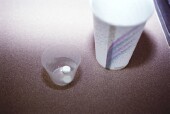
TUESDAY, June 15 (HealthDay News) — Low-dose steroid pills seem to work as well as high doses of injected steroids for patients hospitalized with severe chronic obstructive pulmonary disease (COPD), researchers report.
Yet, some 90 percent of these COPD patients are given the higher doses, which is contrary to current prescribing guidelines, claims the study appearing in the June 16 issue of the Journal of the American Medical Association.
“We really think that doctors should be following hospital guidelines and treating patients with oral steroids, at least for those who are able to take oral steroids,” said Dr. Richard Mularski, author of an accompanying editorial and a pulmonologist with Kaiser Permanente Center for Health Research.
Mularski added that he was surprised that this many patients were receiving IV steroids.
Patients in crisis with COPD are routinely treated with corticosteroids, bronchodilators and antibiotics.
Although it’s clear that steroids are effective in treating COPD exacerbations, it’s less clear which dose is preferable, stated the study authors.
The Massachusetts-based researchers looked at records on almost 80,000 patients admitted with severe symptoms of COPD to 414 U.S. hospitals in 2006 and 2007. All had been given steroids within the first two days of their stay.
The study did not include individuals who needed care in the intensive care unit. “These are patients that were sick enough to go into the hospital, but not sick enough to go into the ICU,” said Dr. Norman Edelman, chief medical officer of the American Lung Association.
Ninety-two percent of patients in the study were treated with higher dose, intravenous steroids, while only 8 percent were given the drugs orally.
And both groups had similar outcomes, with 1.4 percent of those on IV drugs and 1 percent of those taking pills dying.
Meanwhile, 10.9 percent of IV patients and 10.3 percent of oral patients needed ramped-up care, such as mechanical ventilation, meaning the steroids simply weren’t doing their job.
Patients taking pills as opposed to an IV line were also discharged more quickly and, not surprisingly, racked up fewer bills.
And many were probably spared the side effects of taking steroids, such as elevated blood sugar and blood pressure.
Twenty-two percent of patients on oral steroids were moved over to more potent IV drugs during their hospital stay.
The perceived “more is better” rule may be guiding many doctors’ decisions, the experts said.
“In general, especially for hospitalized patients, more is considered better whereas in this case, probably less is more,” said Mularski.
“Acute exacerbation of COPD is a life-threatening event so it’s understandable that doctors want to pull out their big guns right away,” added Edelman. “The attitude of doctors is more is better, but that’s not true.”
Ultimately, though, Edelman pointed out, not all guidelines agree on the correct use of corticosteroids in COPD patients, and decisions need to be made individually.
“It’s hard to take thousands of patients and lump them into a model which treats them as a single patient,” he said. “They have all kinds of different problems and different needs. Some may have diabetes that goes out of whack. Doctors actually have to make decisions.”
More information
The U.S. National Heart, Lung and Blood Institute has more on COPD.

